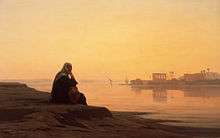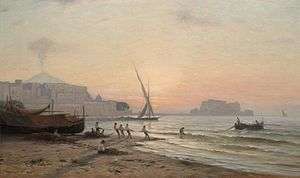Auguste Veillon
Louis-Auguste Veillon (29 December 1834, in Bex – 5 January 1890, in Geneva) was a Swiss painter, noted for his Orientalist works.
Auguste Veillon | |
|---|---|
 The Nile at Philae | |
| Born | Louis-Auguste Veillon 29 December 1834 |
| Died | 5 January 1890 |
| Nationality | Swiss |
| Education | François Diday, Geneva; Ecole des Beaux-Arts, Paris |
| Known for | Painter |
| Movement | Orientalist |
Life and career

After obtaining a degree in Reformed theology in Lausanne, he joined François Diday at his studio in Geneva, where he primarily painted seascapes and mountain scenes from the Bernese Oberland. In 1858, he enrolled at the Ecole des Beaux-Arts in Paris. While in Paris, he spent a considerable amount of time in the Louvre, copying the works of the masters, especially the 17th-century Dutch masters and the work of Claude Lorrain. He later reported that this discipline led him to the luminism characteristic of his paintings.[1]
In Paris, he made the acquaintance of the Orientalist artist, Eugène Fromentin who was his neighbour. This marked a turning point in Veillon's work and aroused his interest in Orientalist subject matter. He traveled to Rome, the Netherlands, Switzerland and Egypt, then lived in Venice for two years, before settling down in Geneva.[2]
Veillon travelled to Egypt at least four times. In 1873, he stayed there with his friend, the artist, Etienne Duval (1824-1919), for a period of four months.[3] In Egypt, he focussed on producing work with Orientalist themes, featuring landscapes showing the Nile or the Dead Sea. His works were very popular, especially in Switzerland.[4]
Although he travelled extensively, Geneva remained at the centre of his life and work. He died there on 5 January 1890 at the age of 65 years.[5]
Work
Veillon distanced himself from the Romantic school of his master, Diday, instead pursuing a more realistic approach. He used soft brush strokes and a slightly pastel colour palette.[6]
'Select list of paintings
- Bedouins at Rest
- Bord du Lac à Rivaz (Lakeshore at Rivaz)
- Les Pêcheurs de la Région de Naples, (Fishermen of the Naples Region)
- La Punta della Dogana, Venise (Dogana Bridge, Venice)
- Dutch River Landscape with the town of Dordrecht in the background
- Tunis
- Calm Water
- The Temple of Philae, Aswan
See also
References
- Schurr, G., 1820-1920, les petits maîtres de la peinture: valeur de demain, Volume 2, Editions de l'Amateur, 1982, p.34
- "Auguste Louis Veillon". Artfinding. Archived from the original on 10 April 2013. Retrieved 11 March 2013.; Zeitschrift für schweizerische Archäologie und Kunstgeschichte. ZAK; Organ des Schweizerischen Landesmuseums, des Verbandes der Schweizerischen Altertums-Museen und der Gesellschaft für Schweizerische Kunstgeschichte, Volume 43, 1986, pp 229-233
- Musée d'art et d'histoire, Voyages en Egypte de l'antiquité au début du XXe siècle, Geneva (Switzerland), Musée d'art et d'histoire, 2003, p. 126 (translated from French)
- General Information Organization, Aujourd'hui L'Egypte, Vol. 38-39, 1997, p. 134
- Jullien, A., Genève Suisse: le livre du centenaire, 1814-1914, Switzerland, 1914, p. 291
- Neuweiler, N., La peinture à Genève de 1700 à 1900, A. Jullien, 1945, p. 96
Further reading
- Rudolf Pestalozzi, Louis Auguste Veillon, 1891